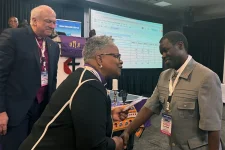People in Zimbabwe picked Rev. Gift Kudakwashe Machinga as their new United Methodist bishop. He won the election on March 15, when church leaders met in Johannesburg. He needed 40 votes to win, and he got 41 out of 60 on the twelfth round of voting. After winning, he thanked the other candidates from Zimbabwe and asked church members to work with him.
The church held a special ceremony for Machinga on March 16 and sent him to lead Zimbabwe. He took over for Bishop Eben Nhiwatiwa, who retired. Machinga will guide both the east and west parts of Zimbabwe for the church. Bishops start with a four-year job, but they can stay longer if people vote for them again.
Machinga became the third bishop chosen that day. The church also picked Emmanuel Sinzohagera from Burundi and Moisés Bernardo Jungo from Angola as bishops. The church made another big change by splitting into two regions—East Africa and Southern Africa. Zimbabwe, along with eight other countries, belongs to the Southern Africa group.
Machinga brings 42 years of church work to his new job. He leads Zimre Park United Methodist Church right now. Last year, he joined an important church committee that handles issues across Africa, Europe, and the Philippines. He has run many churches across Zimbabwe and helped assign pastors to different places.
He taught classes about Christian education at a college for church leaders, represented his church in community groups, and worked with police on faith matters. Early in his career, he even spent time as a pastor in America. He earned several degrees, including a doctorate in ministry.
The big United Methodist meeting last year changed rules about gay clergy and same-sex marriage. Machinga says the Bible and his Zimbabwean background shape his views. He believes marriage happens between a man and a woman but wants to help everyone. His wife, Mazvita, works as a chaplain and counselor, and they have two daughters.
United Methodist bishops direct both spiritual and practical church matters. They decide where pastors serve and handle complaints about church rules. They sit on boards for church agencies and help run programs across the denomination. The church has eight regions worldwide, with Southern Africa and East Africa as the newest additions.
The church held a special ceremony for Machinga on March 16 and sent him to lead Zimbabwe. He took over for Bishop Eben Nhiwatiwa, who retired. Machinga will guide both the east and west parts of Zimbabwe for the church. Bishops start with a four-year job, but they can stay longer if people vote for them again.
Machinga became the third bishop chosen that day. The church also picked Emmanuel Sinzohagera from Burundi and Moisés Bernardo Jungo from Angola as bishops. The church made another big change by splitting into two regions—East Africa and Southern Africa. Zimbabwe, along with eight other countries, belongs to the Southern Africa group.
Machinga brings 42 years of church work to his new job. He leads Zimre Park United Methodist Church right now. Last year, he joined an important church committee that handles issues across Africa, Europe, and the Philippines. He has run many churches across Zimbabwe and helped assign pastors to different places.
He taught classes about Christian education at a college for church leaders, represented his church in community groups, and worked with police on faith matters. Early in his career, he even spent time as a pastor in America. He earned several degrees, including a doctorate in ministry.
The big United Methodist meeting last year changed rules about gay clergy and same-sex marriage. Machinga says the Bible and his Zimbabwean background shape his views. He believes marriage happens between a man and a woman but wants to help everyone. His wife, Mazvita, works as a chaplain and counselor, and they have two daughters.
United Methodist bishops direct both spiritual and practical church matters. They decide where pastors serve and handle complaints about church rules. They sit on boards for church agencies and help run programs across the denomination. The church has eight regions worldwide, with Southern Africa and East Africa as the newest additions.












